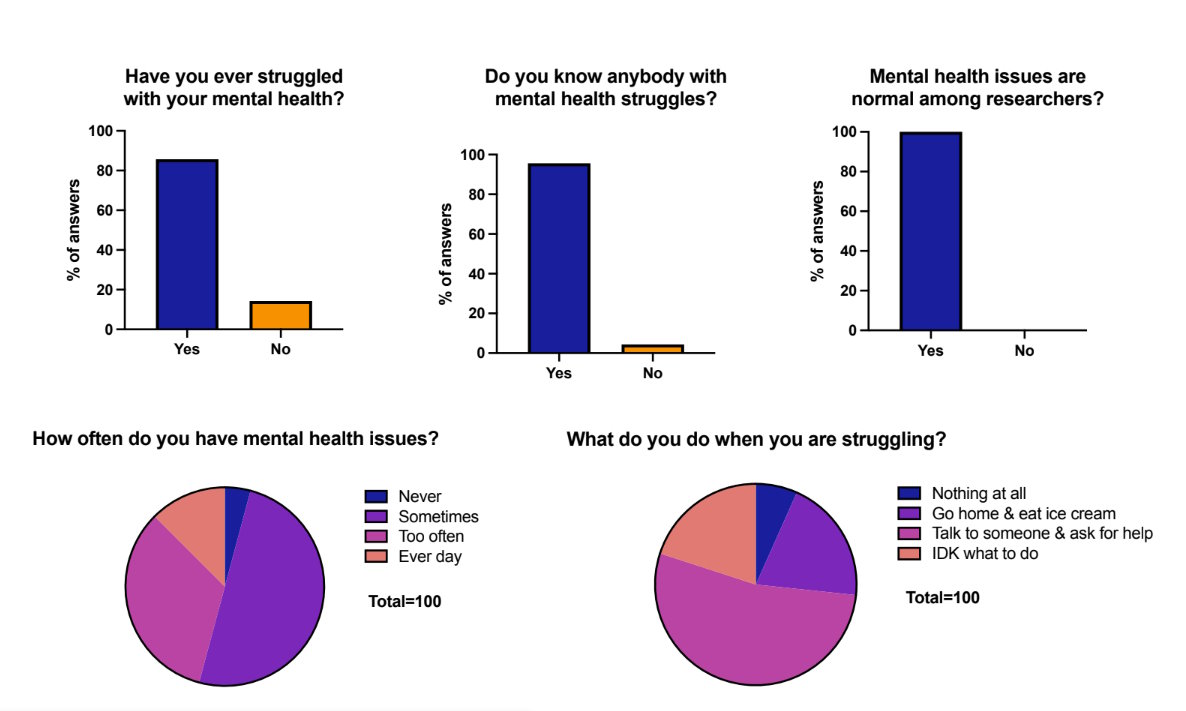Dear colleagues,
We hope you have enjoyed your summer break as much as we did. We are now entering the last trimester of the year, and for redox ECRs it will be full of exciting news. First, we would like to share that we are looking for new members for the ECR subcommittee, so if you are interested in joining us, please fill out the following form: Becoming an SFRR-E ECR committee member Survey (surveymonkey.de).
The beginning of autumn is always a time for planning, for a fresh start, for new projects and ideas, it’s back to school time. So before we stress ourselves with so much thrilling work, we thought that this is the perfect occasion to talk about a very important topic: mental health.
In today's newsletter, we want to start the conversation about how important mental health is and share with you some of the interesting results that we got on the polls that we conducted on our Instagram account. We will announce the super interesting next webinar that we have organized especially for you. We will share with you a summary of August’s webinar, in case some of you were already on holidays and didn’t have the chance to join. At the end of the newsletter, as always, you can also find a collection of upcoming events with important deadlines and some suggestions of interesting redox reads recently published.
10th October, “World Mental Health Day”
Did you know that in the last report of the World Health Organization, in 2019, one in eight people globally was living with a mental health condition? It was indeed estimated that 970 million people in the world had a mental disorder.
Why is mental health so important? It is crucial to the lives of all people as it influences how we think, feel and act. Our mental health is as important as our physical health. When we are mentally healthy we can deal with the stresses of life, fulfil our abilities, learn and work adequately and actively contribute to our communities.
On the contrary, when our mental health is impaired, our well-being is compromised. What are the consequences? It can disturb how we feel and how we think, influence our behaviours, damage our physical health and negatively interfere with our relationships, education or lives.
Every year we celebrate World Mental Health Day on 10th October. This year, the theme set by the World Foundation of Mental Health is ‘Mental Health is a universal human right’.
Why is this special day so important? It is not only about increasing awareness of mental health but also about driving positive change for everyone’s mental health. Besides, it is also a perfect chance to talk about mental health and remove the stigma around the topic, how you need to look after it, and how important it is to get help if you are struggling.
Mental health has recently become a hot topic in academia. Studies have shown that especially early career researchers struggle with their mental health due to publishing pressure, competitiveness, uncertainty for the future, toxic work environments, imposter syndrome…
From the ECR subcommittee we decided to make a poll on Instagram aimed at the young researchers from our redox community to dig around this important topic and what do ECRs think and feel about it. Shockingly, most of the ECRs struggle with their mental health and think that it's normal among researchers.

These results have prompted us to organize a webinar on mental health in October. Let's break the stigma and start talking about it!
Webinar series “Emerging leaders in redox biology”
We are happy to present to all of you the next round of our webinar series. Our next webinar will be on 3rd October 2023 at 15:00 CET and, staying in line with the main topic of this newsletter, we are excited to announce the following talk:
From Lab to Self-Care: A Guide to Mental Wellbeing for Young Scientists

Beatriz Atienza Carbonell, MD & PhD student
University of Valencia & Valencia International University, Spain.
Beatriz is the founder and current member of the Valencia Stigma in Medical Education (VALSME) research group at the University of Valencia and she is a member of the international research group in Lifestyle and Mental Health.
Moreover, she is a member of the European Association for Quality Assurance in Higher Education (ENQA) Experts Pool and Quality Assurance Pool of Students' Experts of the European Students' Union. Since 2016, she has participated as an expert reviewer in different European Higher Education Quality Assurance Agencies. She is currently working as Quality Assurance Manager at the Valencian International University (VIU). Moreover, she is the founder and current member of the Valencia Stigma in Medical Education (VALSME) research group at the University of Valencia and she is a member of the international research group in Lifestyle and Mental Health.
In case you have missed our recent webinar on the 1st of August 2023, here is a short summary. We were so lucky to have the following expert talks on genetically encoded redox biosensors:

Fluorescent protein-based redox biosensors: the aspects less considered
Daria Ezerina, PhD
Department of Bio-engineering Sciences, Vrije Universiteit Brussel
Daria gave an excellent presentation with detailed information about the concepts behind biosensor development. In her talk she addressed the need for full characterisation of the current probes and highlighted the importance in understanding the reductive systems that can influence probe dynamics such as for hydrogen peroxide sensors like HyPer7.

Proteome-wide tagging with genetically encoded redox biosensors to identify highly-localised oxidation events
Paraskevi (Pari) Kritsiligkou, PhD
German Cancer Research Center (DKFZ), Heidelberg, Germany
Pari presented her innovative approach to identify highly localised redox events. By fusing genetically encoded redox probes to the C-terminus of every open reading frame in yeast, the local environment around each protein was measured. This revealed that even within one membrane bound compartment, distinct redox microenvironments can exist that are dependent on the metabolic condition and specific to each protein.
If you missed these talks, you can find a recording of the webinar on the society’s intranet.
How can I join the webinar?
- https://us06web.zoom.us/j/94521633658?pwd=VzNUTzlJTkQzZ0JmeFc3bXcrNmxrdz09
- Meeting ID: 945 2163 3658
- Passcode: 329652
More information about the ECR Subcommittee can be found on the SFRR-E website (https://www.sfrr-europe.org/index.php/sfrre/ecr-early-career-researcher), while regular updates can be found on Twitter (@SFRR_Europe) and Instagram (@sfrr_ecr). For any question or suggestion you might have, you can contact us via email:
Hope to see you online for our Webinar Series appointment,
The ECR subcommittee
Upcoming events:
5th Inflammatory Skin Disease Summit. The Translational Revolution (organized by the Austrian Academy of Sciences)
November 15-16, 2023
Location: Vienna, Austria
Further information: https://www.isds2023.org
SfRBM - SFRRI 2023
SfRBM 2023 & SFRRI 21st Biennial Meeting
15–18 November 2023
Location: Punta del Este, Uruguay
Further information: https://sfrbm.org/meetings/sfrbm-sfrri-2023/
Early Registration Deadline: 2 October 2023
SFRR-E Annual Meeting
5-7 June 2024
Location: Istanbul, Turkey
From Molecules to Tissues: Redox Biology in Action
Further information: https://www.redoxistanbul2024.com/
Thiol-Based Redox Regulation and Signaling Gordon Conference
GRS: 13-14 July 2024
GRC: 14-19 July 2024
Location: Castelldefels, Barcelona, Spain
Further information:
https://www.grc.org/thiol-based-redox-regulation-and-signaling-conference/2024/
Interesting Redox Reads:
Halliwell, B. Understanding mechanisms of antioxidant action in health and disease. Nat Rev Mol Cell Biol (2023). https://doi.org/10.1038/s41580-023-00645-4
Villar, S.F., Ferrer-Sueta, G. & Denicola, A. The multifaceted nature of peroxiredoxins in chemical biology. Curr Opin Chem Biol (2023). https://doi.org/10.1016/j.cbpa.2023.102355
Rius-Pérez, S. p53 at the crossroad between mitochondrial reactive oxygen species and necroptosis. Free Radic Biol Med (2023). https://doi.org/10.1016/j.freeradbiomed.2023.07.022
Margaritelis, N.V. Personalized redox biology: Designs and concepts. Free Radic Biol Med (2023). https://doi.org/10.1016/j.freeradbiomed.2023.08.003
Mas-Bargues, C. Mitochondria pleiotropism in stem cell senescence: Mechanisms and therapeutic approaches. Free Radic Biol Med (2023). https://doi.org/10.1016/j.freeradbiomed.2023.09.019
Lisi, V., Senesi, G. & Balbi, C. Converging protective pathways: Exploring the linkage between physical exercise, extracellular vesicles and oxidative stress. Free Radic Biol Med (2023). https://doi.org/10.1016/j.freeradbiomed.2023.09.021
Call for papers:
Journal: Free Radical Biology and Medicine
Special Issue: Exercise-induced reactive oxygen species as modulators of epigenetic machinery
Deadline: submit your manuscript before 1 December 2023
More information:
https://www.sciencedirect.com/journal/free-radical-biology-and-medicine/about/call-for-papers
Journal: Free Radical Biology and Medicine
Special Issue: Vitamin E Discussion Forum
Deadline: submit your manuscript before 31 December 2023
More information:
https://www.sciencedirect.com/journal/free-radical-biology-and-medicine/about/call-for-papers
Journal: Redox Biology
Special Issue: Interplay between Cellular Redox State and Senescence in Health and Disease
Deadline: submit your manuscript before 31 December 2023
More information:
https://www.journals.elsevier.com/redox-biology%20/call-for-papers/interplay-between-cellular-redox-state-and-senescence-in-health-and-disease
